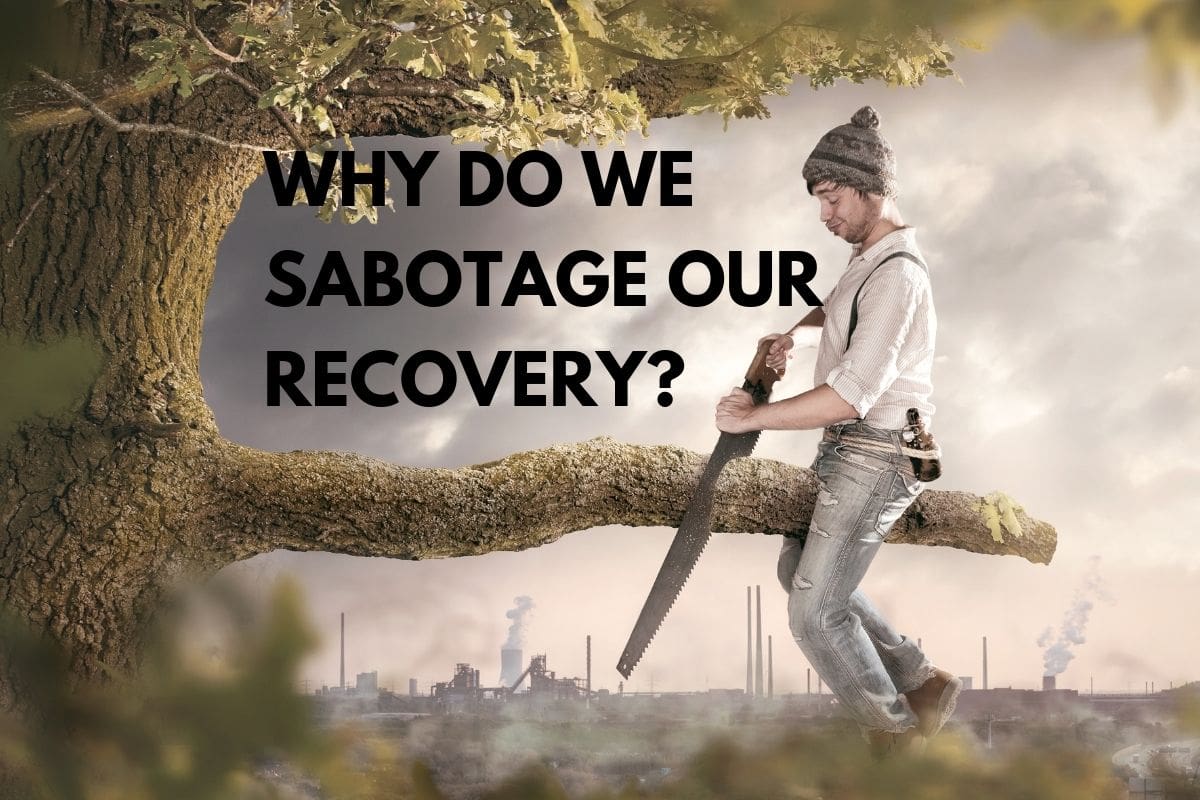Did you know that 40% to 60% of addicts who complete rehab will relapse? An even more significant portion of these individuals won’t finish rehab because they’ll sabotage themselves before they’re able to succeed.
One of the biggest obstacles between recovery and you is yourself. You’re more likely to sabotage your recovery than anyone else. Many people have the tools and resources needed to succeed, but will still fail.
Understanding why we tend to sabotage our own recovery is key to getting sober. You must first fully understand all of the obstacles that are in your way before you can devise a plan on how to succeed. This article will look at this particular phenomenon.
5 Reasons that We Sabotage Our Recovery
Many people have a difficult time with sobriety. This is not because they don’t have the skills to recover, but because these individuals will often sabotage their own progress. There are many reasons why someone might undermine their own recovery. Let’s take a look at 5 of the most common reasons below.
#1. The addict does not have the ability to deal with negative feelings and thoughts.
Many recovering addicts use substances to hide from their true thoughts and emotions. They don’t know how to deal with their inner struggles and turn to substance abuse to feel better about themselves.
The inability to deal with negative feelings and thoughts can also lead to a significant decrease in “feel good” hormones within the brain, like dopamine. Substances, like drugs and alcohol, can temporarily increase the levels of these chemicals within the body.
To prevent recovering addicts from sabotaging their recovery, many substance abusers are encouraged to go to counseling or therapy. There, they can learn some practical skills on how to regulate their own emotions and thoughts. This is also why addicts need to get a mental health assessment when getting admitted into a rehab center. Some individuals struggle with mental health conditions, like anxiety and depression, and will need dual diagnosis treatment.
#2. He or she romanticizes addiction because they are bored.
The truth is that addiction takes up a lot of a person’s time. Many people don’t realize that they don’t have any hobbies other than abusing drugs or alcohol. When trying to get sober, these individuals may not know what to do with their time. They may feel bored. As a result, they may start to romanticize alcohol and drug abuse.
These individuals may start to crave drugs or alcohol simply because their brains are bored. They don’t know what to occupy their time with.
To prevent this from happening, drug and alcohol users should really consider picking up a hobby or two during recovery. Some common hobbies that recovering addicts pick up include painting, reading, hiking, journaling, cooking and even volunteering. The goal is to stay preoccupied, and not to let the mind wander.
#3. The individual has low self-confidence and poor self-worth. 
Studies show that those who have low self-esteem tend to turn to alcohol or drugs. While the reasons behind this are still a mystery, many addiction experts theorize that those with low self-esteem tend to have lower levels of certain neurochemicals.
Taking substances may make these individuals feel as if they’re superman or king of the world. They may feel invisible and confident in who they are. Once these individuals start to recover, they won’t have the artificial boost needed to feel as if they are above the world. Due to this reason, they may sabotage their own recovery in order to feel good about themselves once again.
These individuals will really benefit from having a strong peer support group. Motivation from others who recognize the hard work that they are putting in may be enough to keep them from straying. Having a mentor or a recovery coach may also be key to success for these individuals. Mentors and recovery coaches may act like cheerleaders to keep these individuals on the right path.
#4. The user seeks comfort and familiarity.
Heavy users often sabotage their own recovery because they’re not used to life without drugs or alcohol. They are more comfortable with a life of addiction than a life of sobriety. These recovering addicts may also fear getting sober because they’re not sure what a life of sobriety has in store for them.
The truth of the matter is that humans are creatures of habit. Due to this reason, it’s not surprising to learn that heavy users may feel more comfortable staying under the influence of drugs and alcohol. They may not feel ready to get sober. Some of these recovering addicts may even enjoy the routine of getting and using drugs.
It’s important for the brain to have sufficient time to reset. It takes the average person 66 days to develop a habit. With that said, there are some discrepancies. Some people can develop a habit within 18 days while others can take as long as 254 days to really develop a habit.
Being sober is a habit. It takes time for the brain and body to get used to this state of being. This is why many rehab centers recommend longer treatment times. It’s also why longer treatment times are usually correlated with higher success rates.
The Freedom Center offers outpatient programs that can take months to complete. This will be enough time for most people to develop the habits needed for a healthier lifestyle. We work diligently with each client to improve various aspects of their lives. This may include eating healthier, nutritious meals or getting more exercise on a regular basis.
 #5. He or she has a need to be in control.
#5. He or she has a need to be in control.
This last reason might seem a bit odd; however, many recovering addicts end up relapsing because they have a need to be in control. Substances can numb feelings of fear and anxiety. This can cause many people to feel as if they are in control of stressful situations. It’s also why many professionals who work in high-stress environments turn to alcohol and drugs.
This last reason also ties into a need for familiarity. Those who are in a more familiar environment tend to feel more in control. An individual who has abused drugs and alcohol for long periods may feel more in control when they are in a similar state of mind.
They may fear sobriety because they’re not sure what to expect or what recovery has to offer. Some people may also fear failing. By relapsing on their own terms, these individuals may feel as if they still have some control over their lives and the decisions that they make. Ultimately, these individuals feel that they have more control over their lives if they are drinking or using drugs.
The Freedom Center Can Prepare You for Success
The road to recovery is paved with many obstacles that may cause you to relapse. You may not feel ready to get sober or you may be fearful of what the future has in store for you. Regardless of why you might be sabotaging yourself, The Freedom Center can help. We have a team of addiction experts who can help you get through this phase in your life.
We offer a Partial Hospitalization Program (PHP) and Intensive Outpatient (IOP) treatment programs that will prepare you not only physically, but also mentally, emotionally and spiritually for sobriety. Our recovery programs include evidence-based treatment approaches, like counseling, behavioral therapies and medical detox. We know what it takes to succeed.
Our help does not stop there. The Freedom Center will also create a solid relapse prevention plan for each client. We help you better understand what the next steps are after completing an addiction treatment program.
Have you ever sabotaged your own recovery? Do you have any experiences with relapse? Or, are you merely just concerned that you may sabotage your own recovery? Join in on the discussion by commenting below.



 #5. He or she has a need to be in control.
#5. He or she has a need to be in control. 































